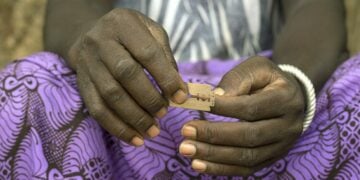The vice chancellor, David Umahi Federal University of Health Sciences, Uburu, Prof Jesse Uneke, has called for new measures to further reduce malaria infection in Nigeria.
Prof Uneke said that the reduction of malaria requires a shift from a one-size-fits-all approach to malaria programming towards a more targeted approach.
Prof Uneke said that the approach requires a renewed focus on the use of high-quality data for efficient planning and effective SNT programme implementation.
The vice chancellor who is also the founder/ director of the African Institute for Health Policy and Health Systems, Nigeria said that Kano State Government has shown commitment towards the elimination of malaria in the state.
The event was organised by the African Institute for Health Policy and Health Systems, Nigeria and the Office of the Vice Chancellor, David Umahi Federal University of Health Sciences (DUFUHS), Nigeria, in collaboration with Solina Centre for International Development and Research, Bill and Mellinda Gates Foundation, etc.
He spoke on the topic, “Promoting evidence-informed policymaking and implementation to facilitate Monitoring, Learning, and Evaluation (MLE) for Malaria Subnational Tailoring (SNT) in Kano State part two.”
He commended the stakeholders’ commitment to the projects and to the malaria elimination programme at large.
He maintained that the policy has been drafted by his team using the findings from the last engagement with the stakeholders as well as available literatures.
“Let me charge you as stakeholders in the elimination of malaria to be diligent in rating the performance of the National Malaria Strategic Plan (NMSP) 2021-2025 in the state and in suggesting ways to enhance the NMSP 2026-2030.”
Prof Uneke stressed the importance of contextual evidence and experiential evidence in conjunction with best available scientific evidence while making policies.
“The use of best available scientific evidence alone in formulating policies, is our greatest undoing. We must emphasize on the role of policy briefs in institutionalizing evidence informed policymaking including the NMSP subnational tailoring.”
A Health Policy and Health Systems expert, Dr Onyedikachi Chukwu enumerated some of the strengths of malaria elimination to include government funding, Widespread ITNs distribution, mass media campaigns and school-based programmes.





